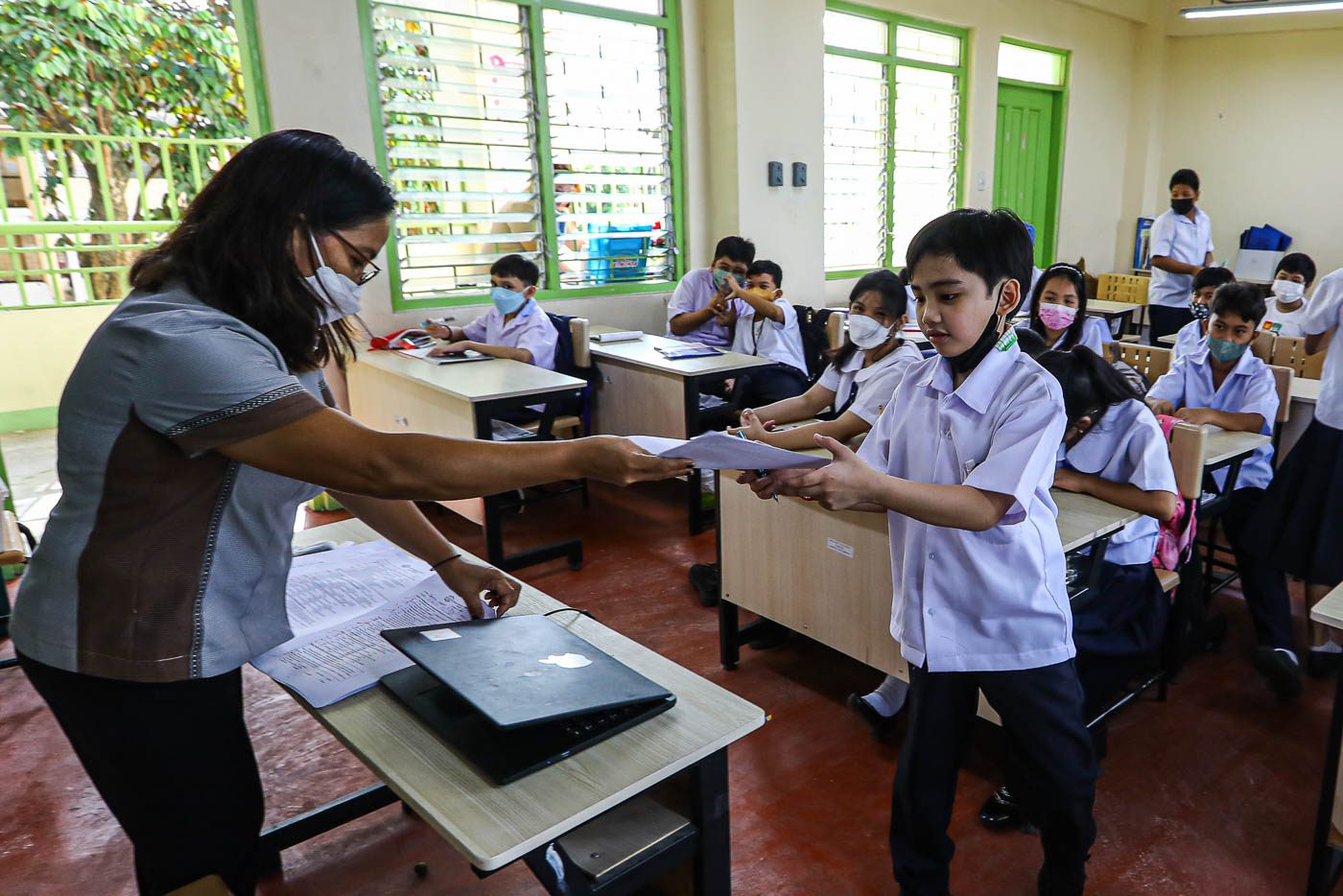SUMMARY
This is AI generated summarization, which may have errors. For context, always refer to the full article.

MANILA, Philippines – A World Bank report revealed that 9 in 10 Filipino students aged 10 are struggling to read simple text. Education experts cited overworked teachers as among the reasons behind the Philippines’ high level of learning poverty.
The Second Congressional Commission on Education or EDCOM II, which was created through Republic Act (RA) 11899, aims to address education woes. It was created to conduct a national review of the country’s education sector after the COVID-19 pandemic had taken a toll on learning.
“Batas na po ang EDCOM II! Para iangat ang kalidad ng edukasyon, hindi na natin maaaring ipagpaliban ang pagpapatupad ng mga kinakailangang reporma,” Senator Sherwin Gatchalian, the bill’s sponsor and co-author, said in a tweet on July 26, 2022. The bill lapsed into law on July 23, 2022.
(EDCOM II is already a law! To improve the quality of education, we cannot delay the implementation of the learning reforms.)
What is EDCOM II?
According to its website, EDCOM II was created for a “comprehensive national assessment and evaluation of the performance of the Philippine education sector for the purpose of recommending transformative, concrete and targeted reforms in the sector with the end in view of making the Philippines globally competitive in both education and labor markets” from 2023 to 2025.
EDCOM II is the successor of EDCOM I, which was created on June 17, 1990 through a joint Resolution of the Eighth Philippine Congress.
It is being co-chaired by Gatchalian, Senator Chiz Escudero, Pasig City Lone District Representative Roman Romulo, and Baguio City Lone District Representative Mark Go. It is also composed of representatives from the private sector.

What are its functions?
According to RA 11899, EDCOM II has the following functions.
- Review, assess, and evaluate the formal and alternative learning systems of education, including continuing systems of education at all levels and the policies on licensure examinations conducted by the Philippine Regulation Commission, and the employment eligibility by the Civil Service Commission, and the competency assessment and certification by TESDA.
- Recommend the improvement in the harmonization of the policies and programs of the Department of Education, Commission on Higher Education, and TESDA.
- Formulate short-term and long-term policy and program recommendations that consist of specific, targeted, measurable, and time-bound solutions.
- Coordinate among departments and sectors concerned with human resource management and development.
- Approve the work plan for the conduct of the national review, assessment and harmonization tasks and the budget for the program of the Commission and all disbursements thereof, including compensation of all personnel.
- Hire and appoint employees and personnel on temporary and contractual basis.
- Hold hearings and receive testimonies, reports, and expert advice on the status of Philippine education, exhaust available options to identify problems, and consolidate coherent courses of actions and remedies.
- Summon by subpoena any public official or private person to testify before it, or require by subpoena duces tecum the production of necessary documents, as may be necessary.
- Secure from any department, bureau, office, or instrumentality of the government such assistance, including technical information, and preparation, and production of reports, and the submission of recommendations or plans, as may be required.
- Conduct multi-stakeholder consultations, using proper mechanisms, and guidance.
- Collaborate with emerging and innovative industries and services for the sharing of important information relative to their practices on specialized training or apprenticeship programs in line with RA 7686, or the “Dual Training System Act of 1994,” and other related laws, to prepare the learners, students, and newly-hired workforce to meet demands of 21st century skills and the Fourth Industrial Revolution.
- Review and upon recommendations of the technical secretariat or standing committees, or both, as it may deem appropriate.
- Report to the Congress its accomplishments on a periodic basis, its findings and recommendations on actions to be taken by Congress, the departments, and other government agencies concerned with education, and provide a final report at the end of the existence of the Commission. The report shall include a roadmap with clear key performance indicators and results framework to address learning crisis.
- Recommend additional legislation to further the objectives of this Act.
- Formulate the necessary rules and guidelines for the effective implementation of this Act.
- Exercise all other powers necessary to achieve the purposes of this Act.
Why is EDCOM II important?
The creation of EDCOM II would provide government education institutions a different perspective on the gravity of the problems and proposed solutions.
“Looking from the outside through an inside. The DepEd is a huge government body, and we want to create a separate independent body looking at the problems from the outside. The concept here is getting an independent body looking inside and getting experts to help that body to analyze the problems and look for solutions,” Gatchalian said in a Rappler interview last February.

In a meeting with Senators on April 13, Vice President and Education Secretary Sara Duterte presented the DepEd’s priority areas to resolve the learning crisis, including the launch of the National Education Portal, a recalibrated National Learning Recovery Plan (NLRP), and the incoming conduct of the National Learning Camp (NLC).
“In order to ensure quality, accessible, relevant, and liberating basic education for our learners, we need to strengthen and sustain our collective efforts as a nation. We still have a long way to go. We need to be resilient. We need to do more,” Duterte said. – Rappler.com
Add a comment
How does this make you feel?




![[Rappler’s Best] Knowing when to leave](https://www.rappler.com/tachyon/2024/07/biden-sara-gfx.jpg?resize=257%2C257&crop_strategy=attention)
There are no comments yet. Add your comment to start the conversation.